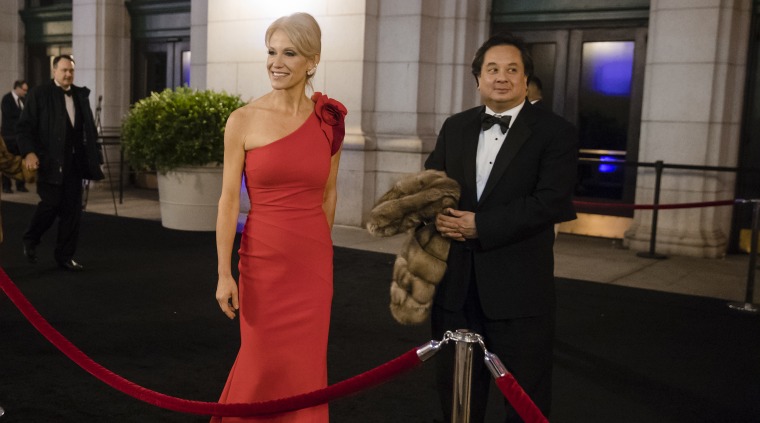Should we be worried about Kellyanne and George Conway? As a historian of marriage, I’ve been getting a lot of questions about the relationship between President Donald Trump’s senior counselor and her husband. George’s increasingly scornful tweets about Trump’s competence and honesty, which imply that Kellyanne’s work defending her boss is a disservice to the nation, have long marked their marriage as unusual.
But the temperature increased noticeably — and very publicly — a few days ago, when George accused Trump of suffering from narcissistic personality disorder. Trump responded that George was a “total loser” and the “husband from hell.” When asked whether it was appropriate for a boss to comment on an employee’s marriage and to attack her husband, Kellyanne counter-attacked, asserting that Trump was well within in his rights to respond when “somebody, a non-medical professional, accuses him of having a mental disorder.”
My decades of experience researching both the history of marriage and its modern evolution suggest that for any normal couple, what we’ve seen the past few days would raise serious red flags. However, this is not a normal couple, so some unusual variables need to be considered. Let me explain.
My decades of experience researching both the history of marriage and its modern evolution suggest that for any normal couple, what we’ve seen the past few days would raise serious red flags.
It’s hard to come up with a historical precedent for this kind of high-profile, politically connected marital sparring. Back in the 1830s, President Andrew Jackson was another president with a reputation for punishing disloyalty and rewarding incompetent — often corrupt — cronies with jobs. Had Jackson employed a public spokesman then, of course, Kellyanne Conway would have been a man, and his wife “Georgia” would have been the dissenting spouse.
SIGN UP FOR THE THINK WEEKLY NEWSLETTER HERE
At that time, though, women were seen as guardians of civic morality. Whenever a man was tempted to sacrifice “justice and honor … to the advancement of personal interest,” preachers said, his wife should “whisper in [his] ear thoughts of holier and better things.” But “Georgia” would only have shared her disappointment about her husband’s defense of the president with God. And her husband likely would have dismissed her scruples — albeit without resenting them. “Women just don’t understand what men have to do in the world, and bless their little hearts for that,” as one 19th century husband put it.
Today, happily, successful marriages are not based on such highly differentiated gender roles. Women as well as men have the opportunity to pursue “personal advancement” and both have equal right to express their moral and political views. On the other hand, though, the extent to which a couple shares values, interests, talents and outlooks is now a major predictor of whether a marriage succeeds or fails. Thus, if the Conways are in an ordinary marriage, that union is in trouble.
George argues that his tweets against Trump are his way of venting, allowing him not to scream at his wife at home. But in reality his tweets are much louder — and heard by a lot more people — than your average dinner table argument. They also reveal complete contempt for the man that his wife spends every day extolling. As it turns out, contempt for what one’s partner is or does is an especially powerful predictor of divorce.
Meanwhile, Kellyanne’s embrace of Trump’s explanation for George’s behavior — that he is jealous of her success — is a classic example of defensiveness. According to renowned psychologist John Gottman, contempt and defensiveness are two of the Four Horsemen of the Apocalypse when it comes to killing relationships, along with stonewalling and constant criticism.
As it turns out, contempt for what one’s partner is or does is an especially powerful predictor of divorce.
Add to these the public humiliation of being the subject of so much gossip and the ordeal their teenagers must be going through, and you would ordinarily have a recipe for a very unhappy family life. As psychologist Joshua Coleman points out, children tend to take an attack on a parent as an attack on themselves, and when one parent appears to attack the other, it is especially hard for them to process.
Still, it’s hard to apply the standards of ordinary relationships to the lives of today’s Washington, D.C. elites. Many seem to be organizing their lives by the rules of reality TV, using every opportunity to audition for their next shot at wealth and fame. And everyone knows that in reality TV, conflict and controversy garner the highest ratings.
So is this all tongue-in-cheek, a tap dance that gives the family a foot in both camps and positions them to jump either way, depending on how Trump’s first term ends? After all, this couple seems to switch principles with considerable ease. George admits to having wept with joy when Trump was first elected. That’s how proud he was of his wife’s skill in rescuing the campaign from “the gutter” into which Trump had run it.
And when Kellyanne was working for Texas Sen. Ted Cruz, she lambasted Trump for victimizing students at Trump University and for claiming he supported “the little guy” when he actually, she charged, built his businesses “on the backs of the little guy.” She has never denied the claim made by “Morning Joe” host Mika Brzezinki that when Kellyanne first started defending Trump on television, she said she would often feel she had to take a shower afterwards.
Perhaps the couple is playing a competitive political game, with neither caring enough about the real-world impact of the actions they so strenuously defend or condemn to erode their love for each other. But that’s still a dangerous script for a marriage. And either way, it sends an even more dangerous message to their four children about prioritizing power, fame and money over shared core values in their future relationships.
